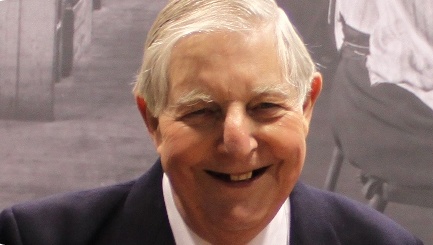|
|
08/21/2014 |
 Ken Hawley MBE, probably the most important figure in modern tool history passed away on August 15th, 2014. For those of you who are unfamiliar with Ken and his work, Ken ran a hardware store in Sheffield starting in the 1940's. To have a little interest in the store window he put a few old tools on display. Over the years people, retired craftsman, widows, etc, would stop by and offer their no longer used tools to Ken. He became a collector. Then, and this is what is so important he started collecting, not so just the tools that were made in Sheffield, but the tools that were used to make the tools. As the tool making industry of Sheffield began to collapse Ken collected whole workshops of tools and records. Without him all of this history would have gone to the dumpster. Pattern books, catalogs, patterns, mother planes. Everything. As he got older Ken's collection was assembled into a trust, and now is part of the Kelham Island Museum. Ken Hawley MBE, probably the most important figure in modern tool history passed away on August 15th, 2014. For those of you who are unfamiliar with Ken and his work, Ken ran a hardware store in Sheffield starting in the 1940's. To have a little interest in the store window he put a few old tools on display. Over the years people, retired craftsman, widows, etc, would stop by and offer their no longer used tools to Ken. He became a collector. Then, and this is what is so important he started collecting, not so just the tools that were made in Sheffield, but the tools that were used to make the tools. As the tool making industry of Sheffield began to collapse Ken collected whole workshops of tools and records. Without him all of this history would have gone to the dumpster. Pattern books, catalogs, patterns, mother planes. Everything. As he got older Ken's collection was assembled into a trust, and now is part of the Kelham Island Museum.
Ken was also an enthusiastic evangelist for tools. If you had a question he was prepared to dig and find you the answer. I only met him once. On a trip to England in 2000 he made time in his busy schedule to sit with me and show me some of the collection. He answered my pretty simple questions without smiling at my ignorance. When I asked about file making, he took me down to the shop where he had a file-making setup and showed me how easy it was to actually cut a file by actually cutting a file. Then, when I mentioned that my specific interest was in English steel or infill planes he apologized saying that in Sheffield there just wasn't much. However, from deep in the collection he handed me a shoebox of what he had. It took a few minutes but I realized what he handed to me was a set of patterns, templates, and jigs from the workshop of Arthur Price, the last of the traditional infill plane makers. It was really something.
Ken's collection of tools and equipment has been fortunately preserved and will educate and illuminate toolmakes for generations to come. This is one enormous and important legacy. But we not only lost a really wonderful person we lost a lifetime of all the knowledge he collected and was so generous in sharing.
Our condolences go out to his friends and family. He will be missed worldwide.
N.B. The picture of Ken is from the Hawley Collection web site.
|
Join the conversation |
|
 Joel's Blog
Joel's Blog Built-It Blog
Built-It Blog Video Roundup
Video Roundup Classes & Events
Classes & Events Work Magazine
Work Magazine



A few corrections.
1. My father didn't run a hardware store - he was a specialist tool retailer - and he went out of his way to make sure people knew it wasn't a hardware store! To stop people going into the shop expecting they could buy nails or screws he put what became a locally renowned sign in the shop window "We sell nowt but tools" ('nowt' means nothing in Sheffield dialect).
2. He set up his own shop in 1959 - although he started his retail life in a hardware shop in Sheffield (Wilkes Bros) in 1947, then he went to work for Joseph Gleave & Son in Manchester (the premier tool retailer at that time) before getting a job nearer home at the firm of Rhodes in Rotherham, where he worked for 10 years before starting his own shop.
His tool shop was acknowledged to be the best in Sheffield and for many, the best in the U.K., as Ken and his two assistant staff has unparalleled knowledge of the tools they sold or what tool would be needed for as job and where they could get it if it wasn't in stock or regularly available. Selling tools in Sheffield wasn't easy, as many people in Sheffield knew someone who worked in tool manufacture who could get a tool (honestly or dishonestly) from their firm - but despite (or in spite of) this Ken's shop thrived until it began to be severely affected by the tool manufacture trades in Sheffield and the UK collapsing under the crushing weight of competition from overseas and the advent of DIY stores selling cheap quality tools. He was not really a businessman - but a tool specialist - whose business allowed him to talk tools to those that came in the shop, freely giving guidance and advice on what tool would best serve their needs - and a good many people then took their custom to the DIY store to buy the cheaper imitations.He finished trading in 1989 - but by then he had amassed a good deal of his collection and knowledge.
3. You are right that my father often persuaded customers in trades to donate or sell him any unusual tools they might have had - but he first started collecting old tools when working in Rotherham he went to an undertaker to demonstrate a planing machine and saw a old brace that was no longer in use on the wall, which took his eye and he asked if he might have it - and he duly 'rescued' it. He was frequently successful in using this approach - often with the question "You'll not be wanting that then will you?" - but he also rummaged skips or old abandoned workshops to rescue catalogues and other items relating to the tool trades that would otherwise be lost forever.
He was producing knowledge on tools and trades right up unto the end of his life - in fact I recently transcribed some notes he made a few days before he died that corrected a 'speculation' about how handles were put on Mortice Chisels - he had seen the job done when visiting a manufacturer and locked it into his memory. It is this sort of first hand knowledge and his acute insight that will undoubtedly be missed.
I never inherited my father's passion for tools and trades - but I am immensely proud of his achievements.
A wonderful man and will be missed by everyone who knew him.